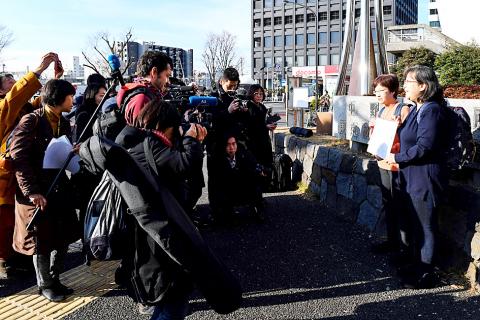Chizuka Oe and Yoko Ogawa have been together for 25 years, but when they submitted their marriage registration at a Tokyo town hall, they knew it would be rejected.
“We were told that they cannot accept our registration because we are both women,” said Ogawa outside the building in western Tokyo.
“There were several heterosexual couples next to us who submitted marriage registrations without any problem,” she added.

Photo: AFP
The couple is planning to take action: Along with 12 other same-sex couples, they will file lawsuits on Valentine’s Day seeking to force the government to recognize same-sex marriage.
“Why don’t we even have the simple choice of whether or not to get married?” Ogawa said, adding that she and Oe were forced to wait a long time before ultimately being turned down.
The five lesbian and eight gay couples involved would file lawsuits across the country seeking damages of ¥1 million (US$9,032) per person for being denied the same legal rights as heterosexual couples.
Japan’s constitution stipulates that “marriage shall be only with the mutual consent of both sexes” and the government has said that this means same-sex marriage is “not foreseen” in the constitution or civil law.
Lawyers for the plaintiffs and legal experts counter that there is nothing in the constitution that would prohibit same-sex marriage.
They have said that the language of the 1947 post-war constitution is only meant to ensure equality between prospective spouses and prevent forced marriages.
The government’s failure to enact a law allowing same-sex marriage breaches the constitutional principle that “all people are equal under the law,” said Akiyoshi Miwa, a lawyer for some of the plaintiffs.
A survey in January found that nearly 80 percent of Japanese aged 20 to 59 support legalizing same-sex marriage.
However, as Japan industrialized from the 19th century, Western prejudices against homosexuality were increasingly adopted.
Oe and Ogawa said they have struggled with confusion and prejudice stemming in part from Japan’s lack of marriage equality.
When the couple attended the funeral for Ogawa’s mother, relatives treated Oe with suspicion, particularly when she handled condolence money.
Ogawa said many relatives quizzed her on who Oe was.
In a landmark advance in 2015, Tokyo’s bustling Shibuya District started issuing symbolic “partnership” certificates to same-sex couples.
Some other local governments — including in the area where Oe and Ogawa live — have followed suit, and corporate Japan is also showing signs of moving toward recognizing same-sex couples.
The certificate confers some rights: When Oe was hospitalized last year and needed a family member’s signature, Ogawa could sign.
However, not all same-sex couples in Japan live in areas with such certificates, meaning that they can be prevented from visiting loved ones in hospitals or refused tenancy because their relationship is not legally recognized.
The Valentine’s Day lawsuits will seek damages, but the couples and their lawyers said that they are ultimately hoping to force a change in the law.
“What we really want is a court ruling that says the failure to recognize same-sex marriage is unconstitutional,” Miwa said.

Four people jailed in the landmark Hong Kong national security trial of "47 democrats" accused of conspiracy to commit subversion were freed today after more than four years behind bars, the second group to be released in a month. Among those freed was long-time political and LGBTQ activist Jimmy Sham (岑子杰), who also led one of Hong Kong’s largest pro-democracy groups, the Civil Human Rights Front, which disbanded in 2021. "Let me spend some time with my family," Sham said after arriving at his home in the Kowloon district of Jordan. "I don’t know how to plan ahead because, to me, it feels

The collapse of the Swiss Birch glacier serves as a chilling warning of the escalating dangers faced by communities worldwide living under the shadow of fragile ice, particularly in Asia, experts said. Footage of the collapse on Wednesday showed a huge cloud of ice and rubble hurtling down the mountainside into the hamlet of Blatten. Swiss Development Cooperation disaster risk reduction adviser Ali Neumann said that while the role of climate change in the case of Blatten “still needs to be investigated,” the wider impacts were clear on the cryosphere — the part of the world covered by frozen water. “Climate change and

Poland is set to hold a presidential runoff election today between two candidates offering starkly different visions for the country’s future. The winner would succeed Polish President Andrzej Duda, a conservative who is finishing his second and final term. The outcome would determine whether Poland embraces a nationalist populist trajectory or pivots more fully toward liberal, pro-European policies. An exit poll by Ipsos would be released when polls close today at 9pm local time, with a margin of error of plus or minus 2 percentage points. Final results are expected tomorrow. Whoever wins can be expected to either help or hinder the

DENIAL: Musk said that the ‘New York Times was lying their ass off,’ after it reported he used so much drugs that he developed bladder problems Elon Musk on Saturday denied a report that he used ketamine and other drugs extensively last year on the US presidential campaign trail. The New York Times on Friday reported that the billionaire adviser to US President Donald Trump used so much ketamine, a powerful anesthetic, that he developed bladder problems. The newspaper said the world’s richest person also took ecstasy and mushrooms, and traveled with a pill box last year, adding that it was not known whether Musk also took drugs while heading the so-called US Department of Government Efficiency (DOGE) after Trump took power in January. In a